

The world of network marketing—also known as multi-level marketing (MLM)—is evolving rapidly. While the traditional models of product-sales plus distributor recruitment remain, today’s winners are those who embrace the next generation of software and infrastructure. In this deep dive we explore how disruptive technologies are reshaping the software platforms that underpin network marketing businesses, highlight fresh market data and benchmarks, and peer into what the next wave of transformation will bring.
To understand what’s coming, it’s useful to first situate the current scale and context.
Network marketing remains a major global business model, but one that is increasingly shifting from purely analog/distributor-led operations toward digital-first systems. This tension creates fertile ground for disruptive technologies in the software platforms powering these businesses.
Disruptive technologies are those that fundamentally change how business is done—not just incremental improvements, but shifts in structure, value chains or foundational operations.
In the context of network marketing software, disruption means:
Let’s examine the technologies shaping the next-gen platforms, and how they’re being applied.
AI is widely recognized as one of the most powerful disruptive technologies. MDPI
In network marketing, AI and automation are being deployed for:
Automated onboarding of distributors (training sequences, video modules, quizzes)
Intelligent chatbots to support distributor queries, customer service and pipeline tracking
Predictive analytics: determining which recruits are likely to become productive, which distributors may churn, which customers may upgrade
? Why this matters: Platforms that embed AI/automation deliver stronger scalability, lower operational overhead, faster time-to-value for new recruits, and better performance-tracking.
Blockchain brings decentralised ledger technology, high transparency, tamper-proof records and smart contract automation.
For network marketing software platforms, possible applications include:
Transparent compensation: when commission triggers fire via smart contracts automatically, avoiding disputes
Token-based reward systems: distributing digital tokens or crypto-assets to distributors/customers which can be redeemed, traded or used as loyalty points
Authenticity and traceability of sales, inventory, down-line recruitment records
? Why this matters: Trust and transparency are persistent challenges in network marketing. Blockchain-enabled platforms can reduce friction, enhance credibility, and open up new compensation/reward models.
Digital shift: The 2025 network marketing trend guide points out that social commerce is becoming an increasingly large part of online sales, which directly impacts how network marketing companies distribute and sell product. hybridmlm.io
Platforms are integrating:
Live-stream selling (e.g., via Instagram, TikTok) into distributor tools
Embedded checkout within social apps (reducing friction for customer purchase)
Short-form video content for recruiting and training distributors
The move from face-to-face catalogue/party models to digital channels is well documented: e-commerce plus content plus social tools are reshaping the model.
? Why this matters: Software that enables seamless social commerce and distribution through digital channels gives network marketing companies an edge in reach, speed and customer acquisition.
Emerging technologies such as AR/VR and gamification are enhancing engagement among distributors and customers. According to a direct-selling trends report: the AR/VR market is expected to grow at ~9.64% CAGR (2025-2028) reaching US$58.3 billion by 2028.
Applications in network marketing software may include:
Virtual product demonstrations (using AR/VR for home-try-on or immersive experience)
Gamified leaderboards, badges, challenges to boost distributor activity and retention (noted in recent network-marketing-US article)
? Why this matters: Engagement and retention are big challenges in network marketing. Technologies that make training, selling and community-building more interactive drive better results over time.
While less flashy, the architectural shift to cloud-native, API-first platforms is an enabling foundation for all the above technologies. Software platforms designed with modularity allow rapid integration of AI modules, blockchain modules, social channels and analytics. Many newer MLM software providers highlight their global, web-based, mobile-friendly architecture.
? Why this matters: Only software built with flexibility can keep pace with evolving technologies and support disruptive features.
As noted, the global MLM market size exceeded US$223 billion in 2024.
Social commerce, which is critical for network marketing distribution, is rapidly increasing its share of online sales in 2025.
The digital marketing software market (an adjacent segment) was valued at around US$60.3 billion in 2022 and is expected to reach US$243 billion by 2032 (CAGR ~15.5%) which gives a proxy for how software-platform demand is growing.
For MLM software specific, the report on demand indicates that between 2025 and 2033 the market is forecasted to grow, although exact numbers are still somewhat opaque.
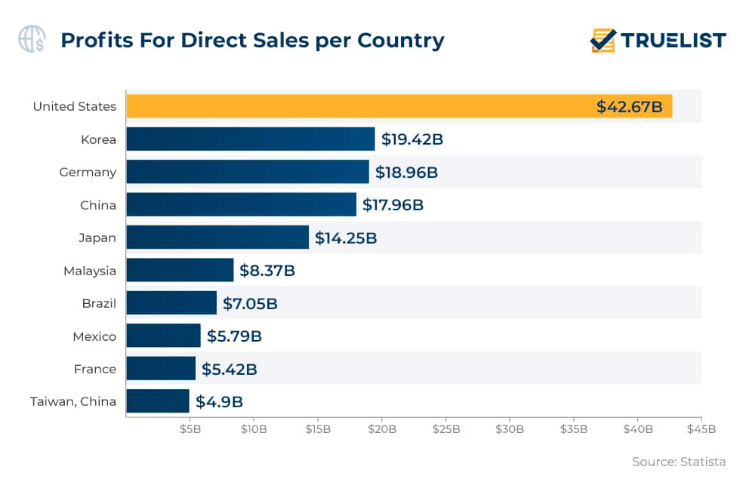
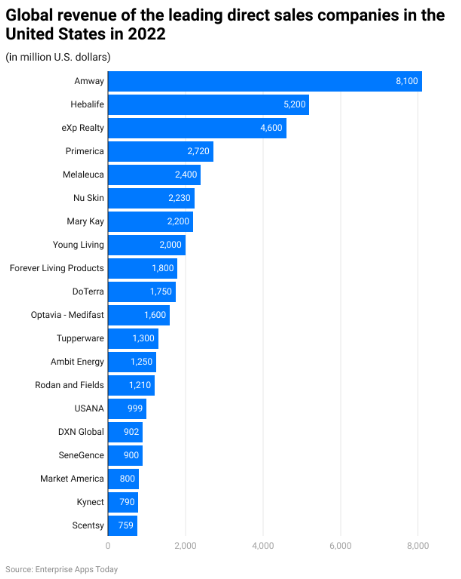
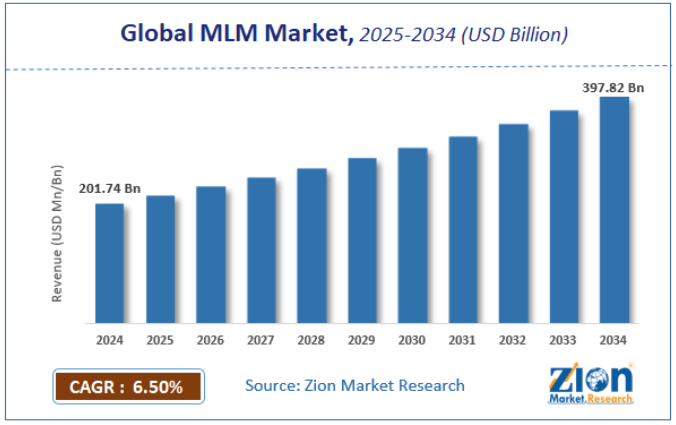
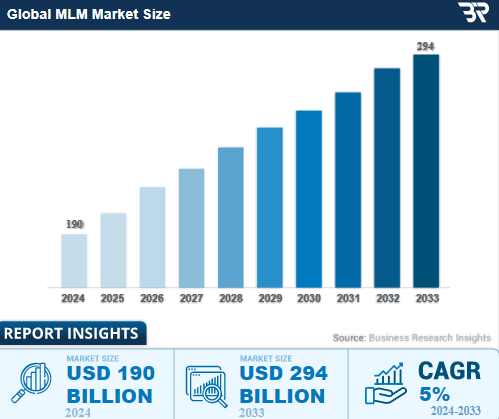
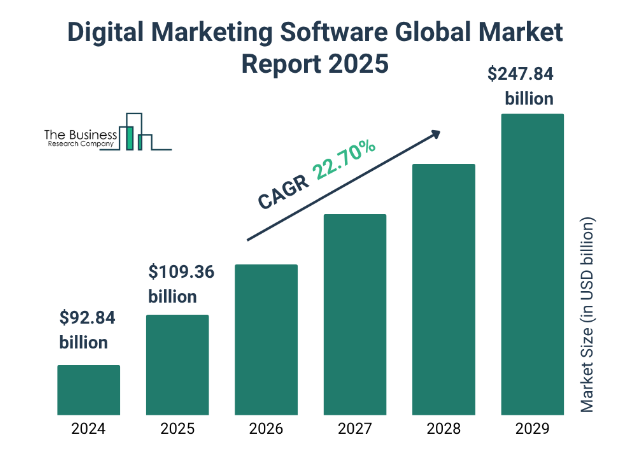
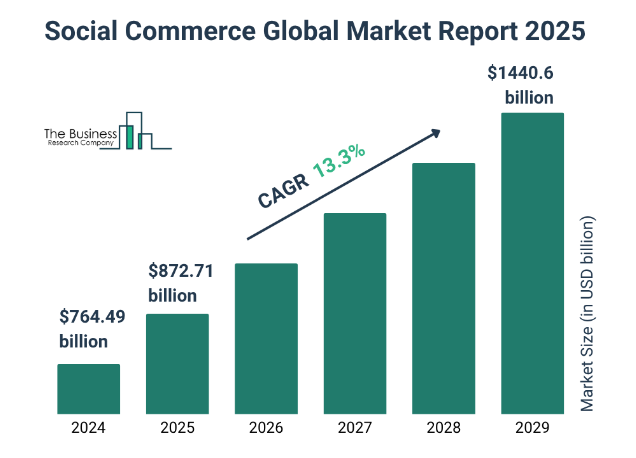
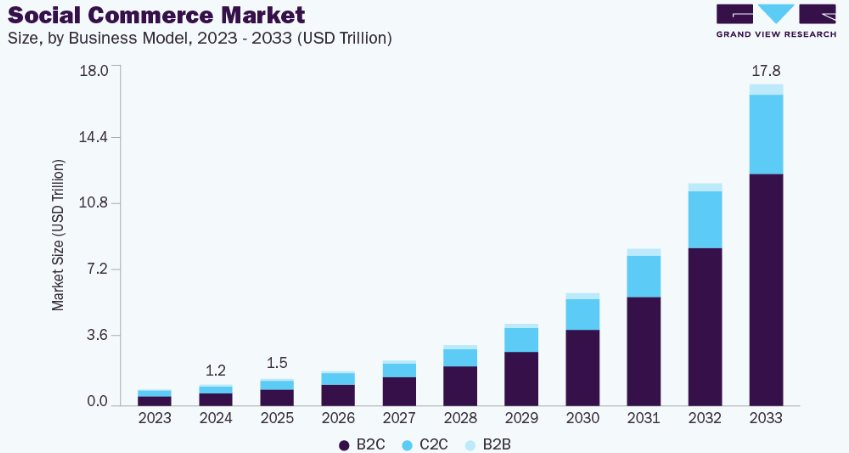
These numbers emphasise that:
Let’s look ahead: which disruptive moves will define the next wave of network marketing software?
With blockchain, companies will move from rigid compensation plans toward token/crypto-reward systems. Distributors might earn digital tokens that are instantly exchangeable, tradable or hold utility beyond the platform. Smart contracts will enact commissions automatically, enhancing trust. As one survey notes, blockchain applications in marketing are maturing but still in early stages.
AI + data analytics will power personal-ised learning paths, product suggestions, distributor coaching and success “roadmaps”. For software platforms this means building modules that adapt to individual behaviour—when a distributor stalls, the system intervenes automatically.
Instead of distributors relying on separate portals, future software will integrate in-app purchasing, live-stream sales, influencer-integration and direct social-platform check-outs. The shift to social commerce as a key sales channel will continue to accelerate.
Training and recruitment won’t just happen via webinars – expect AR/VR onboarding, immersive virtual events, metaverse-style community zones, and gamified leaderboards. Engagement will become a major KPI built into software platforms, not just activity metrics.
As network marketing crosses borders, software must handle multi-currency, multi-language, tax/regulatory compliance, cross-border commissions, data-privacy regulations (e.g., GDPR, India’s data laws). Platforms built for global expansion will win.
Trust has always been a pain point for MLMs. With digital records, blockchain verification, open dashboards for commission tracking and transparent audit logs, software will increasingly function as trust-builders—not just as tools. This overcomes old objections and builds better distributor retention.
If you are a network marketing company, software provider or distributor, here’s what you should consider:
The network marketing industry is no longer just about product + people + commission. It is fast becoming a software-driven ecosystem where technology improves scale, transparency, distributor experience, customer reach and global agility.
Disruptive technologies such as AI, blockchain, social commerce, AR/VR and cloud-native architectures are not just “nice to haves” – they are the foundation for competitive survival or dominance in the field. Companies that adopt them early will likely outperform on scalability, retention and market reach.
Conversely, network marketing businesses that cling to legacy offline models, manual processes and siloed software risk being out-paced by more agile, digital-first competitors. The industry benchmark data already signals accelerating growth in digital and software-driven operations.
What are the most disruptive technologies in network marketing software today?
AI/automation, blockchain/smart contracts, social commerce & live selling, AR/VR experiences, and cloud-native/API-driven architectures.
How does AI improve MLM software performance?
AI powers predictive analytics, automated onboarding and training, chatbots for support, personalized coaching, and churn-risk detection for better retention.
Can blockchain really solve trust issues in MLM?
Yes — blockchain enables tamper-proof compensation records, smart-contract commissions, tokenized rewards and transparent audit trails that reduce disputes.
What role does social commerce play for network marketing?
It embeds purchasing inside social platforms, enables live selling and short-form content funnels, dramatically lowering friction for conversions and recruitment.
Are token/reward systems legal and practical for MLM companies?
Tokenization is practical but must comply with local securities, tax and AML regulations; proper legal counsel and compliant designs are essential.
How should I choose an MLM software provider now?
Prioritize modular/cloud-native platforms with open APIs, built-in analytics, social commerce integrations, and clear compliance/multi-currency support.
What KPIs should I track after upgrading my platform?
Distributor activation rate, time-to-first-sale, retention/churn, average order value, engagement metrics (training completion, live-event attendance), and time to payout.
Is AR/VR and gamification worth the investment?
For companies focused on engagement and training, AR/VR and gamification improve onboarding and retention; run pilot programs to measure ROI first.
How fast will these technologies become mainstream in MLM software?
Expect rapid AI and social commerce adoption (1–2 years), wider blockchain pilots + token experiments (2–4 years), and AR/VR adoption in targeted niches (3–5 years).
How do I ensure my platform stays future-proof?
Use modular, API-first architecture; adopt cloud infrastructure; plan phased rollouts for AI/blockchain features; maintain compliance and clear change management.
👉 Try the official MLM Software Demo for Your MLM Business
and experience what MLM Software looks like when it’s powered by the best.
💌 Or, check out our blog
to compare top direct-selling companies, get insider reviews, and learn how to grow your income ethically in the wellness niche.